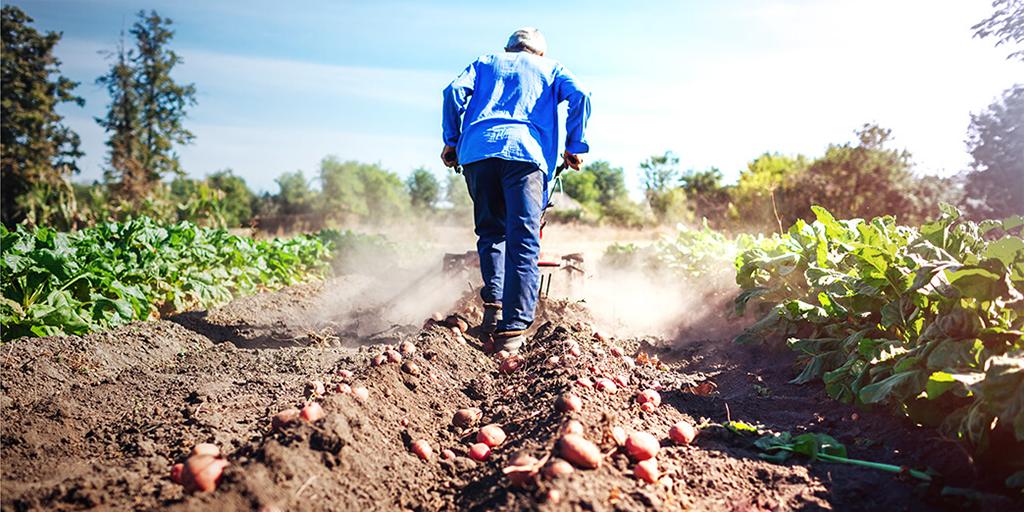
Remember the Plow
The importance of growing food and fiber for a burgeoning population is often lost on city- and suburb-dwellers. Yet, as troubled times bring rising food costs and commodity shortages, people may focus more attention on the details of production, processing, and distribution of basic agricultural necessities, including vegetable produce, poultry, meat, and dairy products. It all starts with the soil, which must be tilled and cultivated to bring a successful harvest. Today, most farming has been mechanized and takes place on large-scale operations, but historically it all started with the plow on small family farms.
The European colonists who settled in America relied upon relatively primitive farming tools. The “plough,” as it was then known, had not changed much since the time of ancient Rome, but the entrepreneurial spirit in the colonies was strong. Several enterprising men improved the design and materials of the plow. Thomas Jefferson, who was interested in innovating farming methods, designed a new kind of plow, but he was distracted by other endeavors and his idea was never produced. A cast iron plow was patented in New Jersey in 1797, but farmers were skeptical of the new tool and it didn’t catch on. In 1807, another design was patented, and the use of a metal plow began to be accepted. In 1837, John Deere patented a cast steel, self-polishing plow that would cut through the tough Illinois prairie soil, and it became very popular. Later, multiple plows were attached together, along with other improvements that increased efficiency and agricultural production. Today, different types of tillage methods are used in modern farming, but it all started with the plow.
The Bible uses agricultural metaphors to illustrate important spiritual principles, so it should be unsurprising that both the Old and New Testament scriptures mention plows. The book of wisdom known as Proverbs makes this point about being diligent: “The lazy person does not plow in season; harvest comes and there is nothing to be found” (Proverbs 20:4, New Revised Standard Version).
The Apostle Paul made his point about a laborer receiving physical and spiritual rewards in his letter to the church at Corinth: “For it is written in the law of Moses, ‘You shall not muzzle an ox while it is treading out the grain.’ Is it for oxen that God is concerned? Or does he not speak entirely for our sake? It was indeed written for our sake, for whoever plows should plow in hope and whoever threshes should hope of a share in the crop” (1 Corinthians 9:9–10, NRSV).
The analogy of the plow is often used to illustrate how humanity, ignoring the commandments of God, ultimately produces sin from their wicked labors; “A haughty look, a proud heart, and the plowing of the wicked are sin” (Proverbs 21:4). The prophet Hosea ministered during a time of great sinfulness and depravity in ancient Israel and Judah that is much like our society today. He used this colorful illustration to make his point: “You have plowed wickedness; you have reaped iniquity. You have eaten the fruit of lies, because you trusted in your own way, in the multitude of your mighty men. Therefore, tumult shall arise among your people, and all your fortresses shall be plundered” (Hosea 10:13–14).
Do we see “tumult” in our cities today as we reap a bumper crop of the sinful deeds we have sown as a people?
Jesus proclaimed a powerful message of the coming Kingdom of God to be ushered in at His return in power and glory. The prophet Isaiah foresaw that time and gave us this glimpse of the future: “He shall judge between the nations, and rebuke many people; they shall beat their swords into plowshares, and their spears into pruning hooks; nation shall not lift up sword against nation, neither shall they learn war anymore” (Isaiah 2:4). Micah 4:3 repeats this wonderful prophecy of a time of peace and plenty.
Jesus Christ gave a Great Commission to His disciples and to those who would come after them—to carry His life-changing message to all the world, teaching the same things that He taught (Matthew 28:19–20). He used plowing to symbolize the work His followers and His Church would undertake as they implemented His instruction. In doing so, He gave this warning about commitment: “No one, having put his hand to the plow, and looking back, is fit for the kingdom of God” (Luke 9:62).
The Living Church of God is “plowing on” in carrying out this Great Commission in many parts of the world by preaching and publishing the same message that Jesus brought and for which all the Apostles, except John, were martyred. Are you ready to put your hand to the plow? The Work is ongoing at TomorrowsWorld.org.
If you found this article to be of interest, be sure to check out the additional resources made available by Tomorrow’s World, including the telecasts “There Is A Real God and He Wants You to Know Him!” and “What Is the Gospel Jesus Preached?”
Stay up to date with our Weekly Digest Email!
Tomorrow's World ComMentary Podcast
Subscribe to Tomorrow's World Commentary podcasts on iTunes and Google Play!



